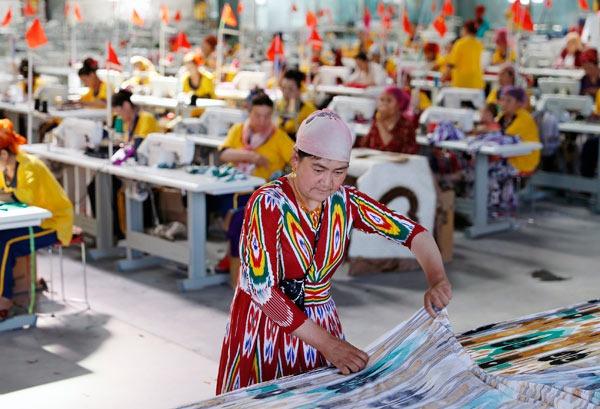 Seamstresses are seen at work at a sewing factory in Xinjiang Uygur autonomous region. (PHOTO / XINHUA)
Seamstresses are seen at work at a sewing factory in Xinjiang Uygur autonomous region. (PHOTO / XINHUA)
US legislation on Uygurs of China signed into law by the US president is not only an interference in China's internal affairs but also smearing propaganda against China, analysts said.
The majority in Pakistan has rejected the so-called US Uyghur Human Rights Policy Act of 2020, which was signed into law on Wednesday
Ahmed Quraishi, public policy writer, researcher and television commentator in Islamabad
"The US bill on Uygur Muslims is a blatant interference in the internal affairs of China," said Salman Bashir, Pakistan's former foreign secretary, who also served as Pakistan's ambassador to China and high commissioner to India.
"The Uygur issue is being created as an element of the US propaganda campaign against China. It will further vitiate relations between the two major powers."
The majority in Pakistan has rejected the so-called US Uyghur Human Rights Policy Act of 2020, which was signed into law on Wednesday, said Ahmed Quraishi, public policy writer, researcher and television commentator in Islamabad.
Source close to the Pakistan Cabinet said Pakistan holds that the US move on Uygur Muslims is "politically motivated", and that China has the right to battle terrorism and extremism with its resources.
A number of politicians in the United States have long openly supported activists in the West linked to the Uygur ethnic group in their moves against China, and even for the goal of splitting the Xinjiang Uygur autonomous region, although the region's habitants include millions of people from dozens of other ethnic groups.
Internal Chinese matter
Quraishi said the Uygur people in the Xinjiang Uygur autonomous region and their well-being is an internal Chinese matter.
ALSO READ: Uygurs upset by ‘missing’ allegations
As a major country with a stable and experienced leadership, China has a high threshold of patience on major issues, he said.
"It's part of the Chinese leadership style, though it might be changing slightly recently in some ways.
"For years, Beijing has been watching and monitoring attempts by multiple regional and international actors to exploit the Uygur card. China did not show a kneejerk reaction to this, but watched it closely and took actions without announcing them in the arenas of diplomacy and intelligence."
Naveed Ahmed, an international affairs analyst and academic, said: "China has never officially commented on internal matters of any other country and the US legislative act will help further deteriorate the ties."
Ehtesham Shahid, a foreign policy expert and editor of TRENDS Research& Advisory in Dubai, noted this is almost the peak election season in the US.
So the act could just be a distraction from the failure of the US administration in tackling the COVID-19 pandemic and channeling public anger over China, he said.
Mohammed bin Salman, Saudi Arabia's crown prince, had made it loud and clear that education for Muslims in Xinjiang was China's "right".
"China deserves the right to carry out anti-terrorism and anti-extremization work for its national security," Prince Mohammed, said last year during his visit to China.
READ MORE: China slams US enacting law on Uygurs
However, many Western politicians and anti-China media outlets are exploiting Beijing's policy of containing the threat of terrorism and educating some Xinjiang residents with vocational skills to further their smear campaigns against China, Quraishi said.
The recent US legislation on Uygur people is a serious development, he said, but this act by itself is not enough to lead to a major escalation in Sino-US tensions.
"Any worsening of Sino-American ties will be linked to major decisions by Chinese and US governments that encompass the entire relationship," he said.
The author is a freelance journalist for China Daily.


